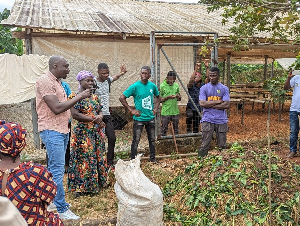In a significant stride towards promoting sustainable agriculture, the Peasant Farmers Association of Ghana, in collaboration with the Council for Scientific and Industrial Research-Crops Research Institute (CSIR-CRI), conducted a successful two-day practical workshop on agroecology and circular economy innovations.
Held on September 26th and 27th, the event attracted 58 participants, including farmer association leaders, agriculture extension officers, NGOs, and civil society organizations engaged in agroecology across the Ashanti Region.
The workshop commenced with hands-on training in simple composting techniques, aimed at reducing chemical fertilizer use and minimizing agriculture-related biomass burning—key contributors to black carbon emissions, a potent short-lived climate pollutant. Participants learned to create nutrient-rich compost from organic waste, enhancing soil health while lowering costs.
Farmers were also introduced to preparing two types of liquid fertilizers using fresh fish and cow milk, combined with water, molasses, and decanted rice-soaking water. This eco-friendly approach empowers farmers to utilize local resources effectively, reducing their dependence on chemical fertilizers.
The second day featured insightful technical presentations, including a key address by Dr. Kwaku Onwona-Hwesofour Asante, ACE4ES project lead. Dr. Asante elaborated on the principles of agroecology and the circular economy, emphasizing their role in enhancing food security and reducing agricultural greenhouse gas emissions.
A focal point of the discussions was the reduction of methane and nitrous oxide emissions in rice cultivation. Dr. Asante highlighted innovative practices such as the System of Rice Intensification (SRI) and Alternate Wetting and Drying (AWD) techniques, which can significantly decrease emissions while improving rice yields.
Mr. Douglas Annor, of Ofinso Partners in Sustainable Development and the Ashanti Regional Focal Point for Peasant Farmers Association of Ghana (PFAG), expressed gratitude for the support of the Climate and Clean Air Coalition.
He stated, “We appreciate the invaluable assistance from the Climate and Clean Air Coalition in supporting the ACE4ES project. This collaboration empowers our farmers with the tools and knowledge to adopt sustainable practices that benefit both their livelihoods and the environment.”
"This workshop represents a vital step in equipping our farmers with the knowledge and tools necessary for adopting sustainable agricultural practices," said Dr. Asante. "Through collaboration and innovation, we can enhance livelihoods and contribute to combating climate change."
The workshop underscored the importance of partnerships between research institutions, NGOs, and farmer associations in driving sustainable agricultural practices. The ACE4ES project remains committed to fostering innovation across Ghana's agricultural sector, paving the way for a greener and more resilient future.
Business News of Saturday, 28 September 2024
Source: Joseph Marfo, Contributor
CSIR-CRI launches initiative to reduce chemical fertilizer use and greenhouse gas emissions
Entertainment
















